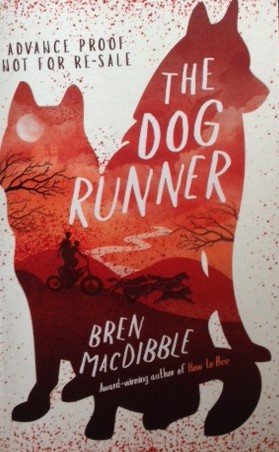Inspiring Young Readers
 posted on 17 Apr 2019
posted on 17 Apr 2019
The Dog Runner by Bren MacDibble
Young people have recently been in the forefront of campaigns raising alarm about the perils of climate change and environmental destruction. What better way to spread these serious concerns to even more people than through a well told story based on sound research? This author has already shown the power of fiction in educating her readers about the demise of bees in her excellent award winning novel How to Bee.
This is another action-packed story that is set in an all-too-possible, dystopian future-Australia where everyone in the cities is starving to death due to terrible crop failures caused by an ugly red fungus and the consequent break down of the food chain. Ella and her half -brother , Emery are very aware of the increasingly hostile people in their local area – a place that had used to be all about helping one another to survive and sharing resources during the early months of the national crisis. It now seems that all the social niceties have totally collapsed to the extent that people are preying on one another’s limited food supplies. Ella’s Mum has been away from home for over eight months as she is working away at a solar power plant, which is a vital government service. Things have become much more frightening since the power has failed for the last three weeks, so they have no means of keeping in touch with her. Now the children’s Dad has also left them while he goes to find out what is happening and to try to bring her safely back. The big plan is for the family to all leave the city to escape up- country where Emery’s mother and grandparents live on a mushroom farm. Although rural areas are also decimated, they hope that life might be much less dangerous than on the menacing city streets and that his grandfather’s experiments with seeds might even provide the answer to renewing farming prospects.
When, after twelve days, Dad doesn’t come back home as planned, the children have to make the difficult decision to start the long journey across the dry and barren landscape by themselves. As the title suggests, this is made considerably easier because they own three big dogs, Maroochy, Bear and Wolf, who are well trained to pull them across the land. Emery has managed to acquire two extra dogs, Oyster and Squid, from a friend who has escaped with his family to New Zealand plus his big fancy cart and camping equipment. The children are well equipped but daunted at what they have to do without the help of adults. They are trying hard to be brave at the same time, given courage by Dad’s wise words:
‘The people who survive when the world turns upside down are the first ones who learn how to walk on their heads.’
I often wonder how I would manage to survive the collapse of society caused by war or environmental disaster and am pretty sure that I would be completely hopeless. Fortunately, both of these children are able to endure slow starvation, make life and death decisions, and to manage dreadful pain and fear as they travel across the land. They have to learn to be very suspicious of people and to harden themselves against feeling sorry for others. But despite this, they remain compassionate and kind to the dogs who depend on the children for scarce food if they are going to be able to keep pulling the cart. In return, the dogs provide them with physical warmth and a feeling of safety during the darkest times. The journey also cements the relationship between the brother and sister as they find out how much they have in common, despite having different mothers. As the bleak hollowness of the environment surrounds them, the richness of many happy shared memories and hopeful speculation helps to sustain them.
As they move away from the city Ella realise the extent of the devastation:
‘I’ve seen all the little dead lawns, I’ve seen the dead parks, I watched the news showing the wheat turn red then black, but I haven’t been out of the city since the grass started dying and this, all this land, all this dead grey and red dirt, stretching on and on over the hills, looking like a desert on the moon, it’s not right’.
This is a novel aimed at children aged 9-12 years, but it is not for the feint hearted because I found it to be fraught with tension and danger. There are several points in the story where I was holding my breath as Ella battles with malevolent humans who seem set to harm them and their dogs. This author also paints a visceral picture of the punishing weather that ranges from relentless searing heat to a wild storm that almost destroys everything. I won’t spoil the conclusion for you but I felt quite exhausted by the end of the book having experienced so many endurance tests. The writing is wonderfully evocative and made more so by an author who wants to give a flavour of the harsh beauty of the Australian landscape, as well as being clearly passionate about her subject. As such, it is strongly recommended for young readers who enjoy adventure, plenty of jeopardy as well as having an interest in the environment.
Karen Argent
April 2019